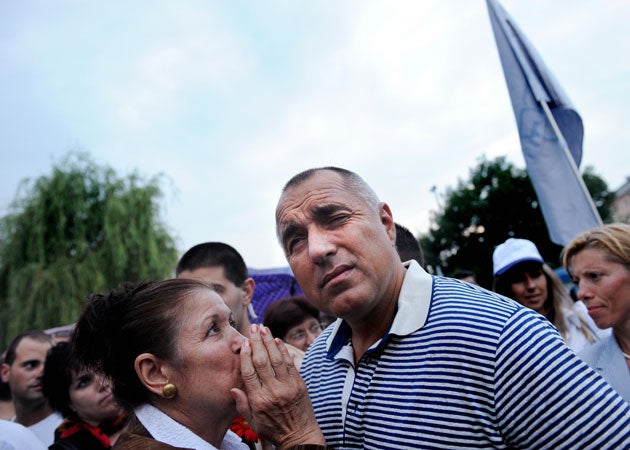Meet the black-belt hardman aiming to lead Bulgaria
Anna Mudeva on the former bodyguard contesting today's elections

Since communism collapsed 20 years ago, Bulgarians have been waiting for a saviour to rid the land of its plagues: corruption, nepotism and impunity for the powerful of the day. Today as the country goes to the polls, hopes are now pinned on a bodyguard-turned-politician with cropped hair, a karate black belt and the epaulettes of a general.
Boiko Borisov, the straight-talking mayor of Sofia, has shot to fame on promises to clean up the Balkan country's image and put corrupt officials and crime bosses behind bars. His centre-right GERB party is set to win most votes, opinion polls show. The question on everyone's mind is whether Mr Borisov – an ex-bodyguard to the late Communist dictator Todor Zhivkov and former King Simeon – is capable and determined enough to confront corruption and the underworld.
One sign of the challenges involved is the fact that suspected criminals have registered to run for parliament to obtain release from custody and temporary immunity from prosecution. The president has called on Bulgarians not to vote for them.
Resentment at home and abroad has reached such proportions that only a root-and-branch overhaul to make magistrates, politicians and crime bosses accountable can repair the damage.
Bulgaria is the black sheep of the European Union: Brussels froze millions in aid last year over fraud, and the country is rated by Transparency International as the most corrupt EU nation.
"Bulgaria's reputation has suffered so much that only radical measures can clean it up," said Tihomir Bezlov of Sofia's anti-corruption Centre for the Study of Democracy.
Another failure to reform the judiciary and address fraud threatens access to the €11bn (£9.5bn) Bulgaria has been promised in EU aid, and could turn membership of the union into an economic handicap. Sofia's annual contribution to the EU budget could exceed its receipts, analysts say. Isolation, criminalisation of entire sectors of the country's economy and a boost for far-right parties preaching euroscepticism could follow, they warn.
Local media say other member states, including the Netherlands, have already begun pressing Brussels for more sanctions against Bulgaria as well as neighbouring Romania, which also joined in 2007. Bucharest has suffered no EU aid freeze so far despite failures to address rampant corruption effectively.
Mr Borisov's track record shows he is an uncompromising man of action. He personally headed raids against drug traffickers and criminals when he was the interior ministry's chief secretary, and received the rank of general in the previous government.
As mayor of the capital, he has fired numerous officials from city contractors and agencies and prosecuted them on suspicion of fraud. Ordinary people like him because they say he is the only one at the top who does something and is not afraid to confront anyone. Always accompanied by his bodyguards, he has won hearts with his down-to-earth, often coarse, language. But to regain the trust of Brussels, Sofia will have to show that crime bosses too can be held accountable.
"Surely, not all corrupt people will get caught but if three or four oligarchs, as the people call them, get sent to jail then the others would get scared," said Etienne de Poncins, France's ambassador to Sofia.
But some EU diplomats express scepticism about Mr Borisov's resolve for deep change because of alleged past links with Bulgaria's underworld. Borisov, who was a firefighter before founding a private security firm in the 1990s, reacts with outrage to such allegations, rejecting them as propaganda. But critics say his party has so far failed to produce concrete ideas about how to reform the judiciary. The depth of change will depend to a large extent on whether GERB is forced into a broad coalition.
The recent European Parliament elections suggested this was likely after GERB got 24.4 per cent of votes against 18.5 per cent for the socialists. A coalition could lead to compromises. The worsening economic situation and falling budget revenues will also test GERB's determination to tackle graft.
"We will see some long-delayed reforms but not radical change," said one diplomat. "Bulgaria will end up like Italy in five to 10 years: corruption will be endemic and the economy will be charging along."
Subscribe to Independent Premium to bookmark this article
Want to bookmark your favourite articles and stories to read or reference later? Start your Independent Premium subscription today.

Join our commenting forum
Join thought-provoking conversations, follow other Independent readers and see their replies